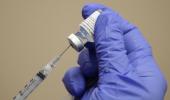The expert committee sought more information from Serum Institute about the Oxford-AstraZeneca vaccine.
Ruchika Chitravanshi and Sohini Das report.

Soon after the UK drug regulator approved the Oxford-AstraZeneca vaccine on Wednesday, December 30, Indian authorities got into action to consider the applications from key players like Serum Institute of India and Bharat Biotech for emergency use authorisation.
Serum Institute is in a tie-up with Oxford-AstraZeneca to manufacture vaccine against COVID-19.
However, following hours of data analysis, the Subject Expert Committee in the Central Drugs Standard Control Organisation (CDSCO) decided to meet again on January 1 for further analysis of the additional information supplied by Serum Institute and Bharat Biotech.
A statement issued by the Union health ministry confirmed that a meeting of the expert panel would be held on Friday.
'The analysis of the additional data and information is going on,' it said.
Reacting to the UK authority's approval, Adar Poonawalla, CEO , Serum Institute said, "This is great and encouraging news. We will wait for the final approval from Indian regulators.
American pharma giant Pfizer, which already has approval in the UK and the US for ITS Covid vaccine in partnership with German major BioNTech, has asked Indian authorities for more time to present its data.
Sources close to the development said the expert committee sought more information from THE Serum Institute regarding the Oxford-AstraZeneca vaccine.
They indicated that even with Britain's Medicines and Healthcare products Regulatory Agency (granting approval to Oxford-AstraZeneca vaccine in the UK after prolonged examination of data, India is treading carefully.

Top representatives in the government have maintained that India's very close to getting a vaccine.
According to industry sources, the Subject Expert Committee, which is advising the Drug Controller General of India on the matter, has 'sought more granular data from the firms on dosages and other updated information from subjects'.
The Serum Institute, the world's largest vaccine maker by volume, is expecting the final approval by the regulator in the next few days.
Britain's MHRA has approved the Oxford-AstraZeneca vaccine for use for people 18 years or older and consists of two doses, with the second dose administered 4-12 weeks after the first dose.
The company had been submitting data to the UK regulator since September 2020 under a rolling review process, enabling data to be reviewed in stages, as it became available.
A BBC report said the UK has ordered 100 million doses -- enough to vaccinate 50 million people.
This would cover the entire population when combined with the full order of the Pfizer-BioNTech jab, the UK's Health Secretary Matt Hancock said.
The outcome assessment of the UK-MHRA for grant of emergency use authorisation was one of the additional information that India's Subject Expert Committee had asked the Serum Institute to provide over two weeks ago.
The panel had also asked the company to provide updated safety data of the phase two and three trials, immunogenicity data from the clinical trials in the UK and India.
While the Pune-0based company's founder Cyrus Poonawalla told media outlets that there was no purchase agreement or any firm commitment on procurement for the vaccine by the government till now, SII has stated that most of its present stockpile of 40 million-50 million doses will go to India once the emergency approval is granted.
The company will scale up to produce 100 million doses per month when its third facility becomes operational by March 2021 and 300 million doses by July 2021.
India plans to inoculate 300 million in the first tranche of vaccinations including healthcare workers, frontline workers and those above either 50 years of age or with comorbidities.
The Serum Institute also has an agreement with the COVAX, also known as the COVID-19 Vaccines Global Access Facility, of which India is a part for 200 million doses of the Oxford-AstraZeneca vaccine.
The company had said it would offer up to 100 million doses at a price capped at $3 for 92 low and middle-income countries including India.
Compared to Pfizer-BioNtech's vaccine, which has temperature requirement of minus 70 degree Celsius, the Oxford-AstraZeneca vaccine would be easier to deploy with manageable cold storage requirement of 2 to 8 degree Celsius.
Bharat Biotech is in the middle of its phase 3 efficacy trial in India and has recruited over 13,000 volunteers already.
Bharat Biotech had applied for marketing approval based on phase 1 and 2 data.
Its CMD Krishna Ella indicated recently that since data from monkeys have shown the efficacy of the vaccine, and the phase 1 and 2 human trial data showed that it was safe, one could apply for marketing approval.
Feature Presentation: Ashish Narsale/ Rediff.com













 © 2025
© 2025